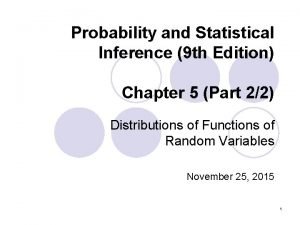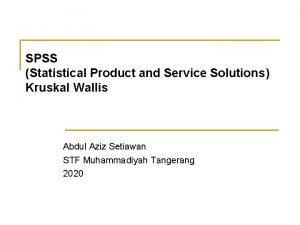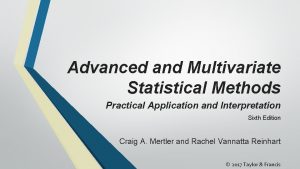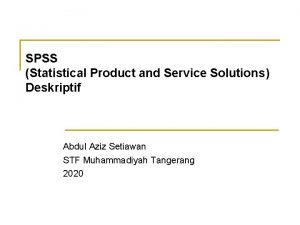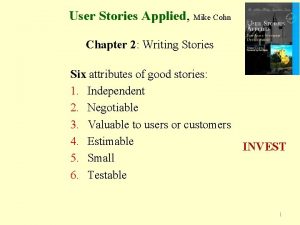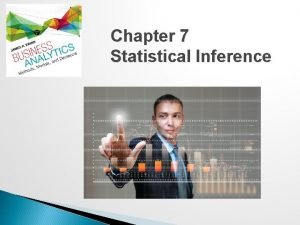GOVERNMENT AND STATISTICAL STORIES GOVERNMENT AND STATISTICAL STORIES





































- Slides: 37

GOVERNMENT AND STATISTICAL STORIES

GOVERNMENT AND STATISTICAL STORIES • Jennifer La. Fleur wasn't looking for a date. But she wanted to find the best places to meet single people. Using a census database, she found the information she needed – and something she didn't want. • “I threw out the data for prisons, ” she said. “They had a high volume of single men, but not men I'd want to date. ” • Combining some statistics with some old-fashioned reporting, she discovered that the best place to find single men was in grocery stores.

GOVERNMENT AND STATISTICAL STORIES • “After I did the story, an 85 -year-old woman called me and said, 'I loved your story, honey, but could you do it by age? ” • La. Fleur is now director of computer-assisted reporting for the investigative reporting site, Pro. Publica, a nonprofit newsroom for journalism in the public interest. • http: //www. propublica. org

GOVERNMENT AND STATISTICAL STORIES • The term computer-assisted reporting often refers to the use of databases, but also refers to use of the Internet to find sources, documents, and information about millions of topics. • You can download many government databases directly into your computer and analyze them in a spreadsheet program such as Excel that allows you to find and compare data.

REPORTING TIPS • Human interest: Make government relevant to readers by finding people who are affected by the actions of government agencies. Using social media tools, you can find sources to contact. But don't forget the old-fashioned reporting technique of going into the community and talking to people faceto-face. • Memos and letters to and from city officials: Check with the city clerk or administrative assistants for access to files about any issue involving public funds. Most of these are public records.

REPORTING TIPS • Consultants: Check who gets consulting contracts and fees, and investigate previous studies on the same subject. • Zoning meetings: These can be full of human interest. People care about what is going up or down in their neighborhood. • Legal notices: Check them for bids and other notices. Government agencies must advertise for any major purchases.

REPORTING TIPS • Audits: They can reveal misuse of public funds. • Union leaders: Cultivate heads of unions in school districts and cities as sources. They know what's going on behind the scenes. • Nonofficials: Talk to the people who do the work. Get into school and write about what teachers and students are doing or talk to people working in government offices. Spend some time learning what they do and how they do it.

REPORTING TIPS • The system: Learn how it works. Are officials in your town following the laws? If you don't know how government is supposed to operate, you won't be able to find out if it's working properly. • Records: Check expense accounts, purchasing vouchers and other records pertaining to issues or officials you are covering.

REPORTING TIPS • Offices: Check all the offices in your government building and find out what kind of work the people in them do. Do you know the function of every office in your campus administration building? You could find great features or great news stories just by checking what people do in these offices. • The Internet: Many communities, local police departments and school districts have web pages, Facebook and Twitter. Good for sources and press releases.

VISUALS • Fact boxes and charts to break out key concepts of a proposal or budget. • If you use one, you don't have to clutter the story with the same information. • http: //www. ghnewsroom. com/newsroomhandbook/breakoutboxes/x 1447153268/Cultu re-Cube-Breakout-box-options? photo=0

WRITING TIPS • Use short, simple sentences • Keep the subject and verb close together • Use vigorous verbs – replace bland verbs. • “A 42 -year old St. Joseph man escaped a blazing house without serious injuries when he grabbed a coffee table, hurled it through a window, and then, like a movie stunt man, leaped through the jagged glass to escape the heat and flames.

WRITING TIPS • Avoid starting sentences. • DON'T: There was sadness expressed among local people gathered Thursday night to watch their team lose by two points in the NCAA finals. • DO: Local people expressed sadness as they gathered Thursday night to watch their team lose by two points in the NCAA final.

WRITING TIPS • Interpret information: Tell readers how they will be affected. • “The value of real estate in the country jumped roughly $83 million in one year – an increase of about 27 percent. • What does that all mean to the average homeowner? Most likely a lower tax rate – called a mill levy – and perhaps a lower tax bill for some, Douglas County Administrator Craig Weinaug said.

WRITING TIPS • Vary the pace: Avoid writing huge blocks of complicated concepts and complex sentences. Follow long sentences and long paragraphs with a shorter sentence. • When Pittsburgh school board members voted to cut three sports and millions of dollars in jobs and services earlier this spring, they said they hoped they would be able to restore some of those cuts once the borough and state budgets were finalized. • Their wish has come true. • Between Pittsburgh and the state, local schools will get around $3 million more next year that district officials originally anticipated.

WRITING TIPS • Focus on a person to explain impact: The way an issue affects one person makes it clear to many. • Linda Green paid $42, 000 in 1982 for a house on a half-acre lot in Fontanta, banking on the equity that would build over the years. • But if Fontana's new general plan is approved, Green is fearful her property may be worth no more than the day she bought it. • The proposed plan would change the zoning on her half-acre so no additional homes could be built on it, making the site less attractive to buyers. • Green is not alone in her fears. She is among several landowners complaining Monday that the revised general plan – a blueprint for Fontana's growth – will put their properties in less profitable zoning areas.

WRITING TIPS • Use an impact lead or explain the impact in the story. • A $10, 000 car would cost $25 more in taxes, a $40 saw an extra dime and a $4 six-pack of imported beer a penny extra in Rockford if Alderman Ernst Shafer, R-3 rd, gets his way. • Shafer wants Rockford to join the push in Springfield for a 0. 25 percent increase in sales tax. Locally the sales tax would rise from 6. 25 percent to 6. 5 percent under the proposal.

WRITING TIPS • Avoid boring quotes: You don't have to quote an official to prove you talked to him or her. If you can express the official's point better in your own words, do so. • Use the pull quote test: Are your quotes strong enough to be broken out as pull quotes? That's the test. • Use conversational style: Write the story as if you were having conversation with a friend.

STATISTICAL STORIES • Use analogies: Whenever you are referring to large numbers, comparisons with something familiar to readers is especially helpful. • Each minute, about 30 gallons of Alabama river water, or the equivalent of what it would take to fill 60 Olympic-sized swimming pools, flush into Mobile Bay, washing over oyster beds in the northern part of the bay closed to harvesting.

GOVERNMENT AND STATISTICAL STORIES Budget stories: Budget stories are hard to write and even harder to read if you flood them with a lot of numbers. You can't avoid using numbers in all stories, but don't put several numbers in the same sentence or paragraph. (http: //www. cbsatlanta. com/story/19968903/atlanta-city-council-membersconsider-raise-proposal)

BUDGET STORIES Explain change: Do the numbers show an increase or decrease from a previous period? (Is the city spending 10% more of taxpayer dollars on schools? Why? )

BUDGET STORIES State the significance: What do the numbers mean and why are they important? Explain what is interesting or important about these statistics in a way that will make readers care. You can even use a transition such as “Here's what this means to you. ”

BUDGET STORIES: ASK THESE ? Who: Who is most affected by the budget? Who are the winners and losers? What: What are the major changes in a budget? How does it compare to previous years? Don't just say the budget or tuition has increased by 10 percent, give the figures.

BUDGET STORIES: ASK THESE ? When: When do the proposals go into effect? Not all budgets have immediate ramifications. Where: Where are the increases and decreases in the budget?

BUDGET STORIES: ASK THESE ? Why: Why are the cuts or additions to the budget being proposed? Budget planning starts several months before the budget is approved. Learn how to interpret the proposed budget by asking a financial officer or city official to explain it to you. (They will)

BUDGET STORIES: ASK THESE ? Revenues: The income, usually derived from taxes, primarily property taxes in municipalities. But there also sales taxes, income taxes, and fees. Look for clues about how revenue will be raised. Expenditures: Where most of the money will be spent. Will some departments be increasing more than others? Generally, budgets include figures from previous years.

BUDGET AND TAX TERMS Assessments and property taxes: Common in municipal budgets, where taxes are based on real estate. Homeowners pay taxes based on an assessment, or estimated value of their property. This is determined by a municipal appraiser. Capital budget: Money used to pay for major improvements, such as the construction of highways or new buildings. Capital is often raised by selling bonds and people who buy the bonds, receive interest. The government then uses the money and repays the bonds, plus interest, over a period of years in what is called “debt service. ”

BUDGET AND TAX TERMS • Deficit: When government spends more money that it receives. • Fiscal year: Year in which budgeted funds will be spent. In government, the budget term often starts July 1 and goes to June 30. • Mean: An average, the sum of all the figures divided by the number of items in the survey. If the salaries of 100 journalists totals $3 million, they have a mean salary of $30, 000.

BUDGET AND TAX TERMS • Median: An average; the value in the middle of a range. If 15 journalists in a survey earn from $20, 000 to $65, 000, you would list all salaries in numerical order and find the one in the center of the list. • Mill/levy: Unit equal to $1 for every $1, 000 that a house is assessed. Local school and city taxes are based on mills. Explain the impact of these taxes clearly. If the school tax rate is 25 mills, the story should say, “The tax rate is 25 mills, which equals $25 for every $1, 000. • Then give an example. “Under this tax, homeowners with an $80, 000 home (multiplied by. 025) would pay $2, 000 in school taxes.

BUDGET AND TAX TERMS • Per capita: the rate person. If a community has 50 murders and a population of 175, 000 people, the per capita murder rate would be determined by dividing 50 by 175, 000. • Reappraisal: State or local decision to reevaluate properties in the community, usually to increase values. This action almost always generates good stories because it affects people dramatically.

WRITING TECHNIQUES • What to include: • • Total amount of the budget (rounded off when possible – $44. 6 million instead of $45, 552, 379) • • Amount of increase or decrease • • Tax or tuition levy, or how funds will be raised (impact on reader, comparison to current tax) • • Major expenditures (major increases and decreases in departmental funds)

WRITING TECHNIQUES • • Consequences (impact on the government or agency – cuts in personnel, services and so on) • • Historical comparisons (how budget compares with previous year and past few) • • Reactions from officials and people affected by increases or decreases • • Definitions and explanations of technical terms

ANECDOTAL LEAD FOR BUDGET STORY • It was 8: 05 on a Monday in August, Rosemary Farnon remembers, when her husband, Tony, called the police to report that their rowhouse in the Juniata Park section had been ransacked. • Amid shambles of overturned furniture, scattered papers and food taken from the fridge, the Farnons nervously and angrily waited nearly five hours before an officer appeared. He explained apologetically that the local police district had no cops to spare. • Theirs is one true story, from one neighborhood, but it typifies what is happening across Philadelphia: • Taxes are up and services are down – and residents are unhappy about it. • So Rosemary Farnon and hundreds of thousands of taxpayers will be listening closely Thursday when the mayor proposes the budget for the coming fiscal year, which begins July 1.

BUDGET STORY EXAMPLE Mayor Barbara Wallace introduced the 2012 budget at the April 11 council meeting, after delaying the presentation at the March 28 meeting. Wallace presented a $35. 3 million budget, coming in nearly $1 million less than the 2011 municipal budget. The amount to be raised by local taxpayers is $25. 9 million, which is just under a 2 -cent increase. The average assessed home in the township at $130, 000 could expect about a $25 increase per year on municipal taxes, officials said.

BUDGET STORY EXAMPLE “This is a budget that reflects the harsh fiscal reality that we, along with many municipalities across the state, are facing as a result of the global economic downturn, ” Wallace said in her presentation to the council and the public. “It is a budget that places a priority on providing the critical services taxpayers depend on while addressing problems that have been put off for far too long. ” As part of the mayor’s capital improvement plan for the roads in Washington Township, $350, 000 is being set aside in the 2012 budget. An additional $210, 000 in spending is designated for contract resolution in the township. Spending is down by about $840, 000, as compared to last year’s $36. 1 million budget. This year, the township drew $1. 2 million from the surplus; last year, $2. 5 million was used from the surplus account to go toward the budget.

CRIME STATS STORY EXAMPLE In 2010, Cherry Hill reported 17 fewer violent crimes compared to the previous year, according to the Uniform Crime Report, an annual report based on crime statistics collected from all police departments. Although murder, rape, robbery and aggravated assault are on the decline in the community, the report shows an increase in non-violent crimes, including burglary, larceny-theft and motor vehicle theft. Cherry Hill reported 2, 175 non-violent crimes in 2009 and 2, 222 in 2010. Thefts increased the most of any crimes reported, jumping from 1, 745 to 1, 845 in 2010.

CRIME STATS STORY EXAMPLE Cherry Hill Police Department Public Information Officer Lt. William Kushina said the economy has taken a toll on many, and has led to an increase in car thefts, scrap metal thefts, and more incidents of copper and air conditioner thefts from residential homes and businesses. In response to this trend, which the police department was well aware of prior to the release of the 2010 report, the department implemented the “Lock it or Lose it” campaign during the spring of 2010, Kushina said. The public-awareness campaign is aimed at educating residents to lock their car doors at all times, even when cars are parked in the driveway. Kushina said the program has been successful, but says residents can expect to see increased figures in next year’s Uniform Crime Report, as well, based on the continuing trend of thefts in the township.

CRIME STATS EXERCISE Access the website for the crime statistics on your campus. (http: //www. temple. edu/safety/asfr/) Look for patterns – increases and decreases. What are you finding?
 Government statistical service graduate scheme
Government statistical service graduate scheme Statistical officer
Statistical officer State and federal constitutions
State and federal constitutions Short story with problem and solution
Short story with problem and solution Poseidons roman name
Poseidons roman name Analyzing character, theme, and plot in short stories
Analyzing character, theme, and plot in short stories Once there a king and queen
Once there a king and queen Gerund story
Gerund story What is a short story meaning
What is a short story meaning Jeopardy tone
Jeopardy tone Panos ipeirotis
Panos ipeirotis Statistical symbols and meanings
Statistical symbols and meanings Proof of chebyshev's inequality
Proof of chebyshev's inequality Probability and statistical inference 9th solution pdf
Probability and statistical inference 9th solution pdf Six sigma statistics cheat sheet
Six sigma statistics cheat sheet Multiplexing and spreading
Multiplexing and spreading Analogical
Analogical Kruskal wallis spss
Kruskal wallis spss Strengths of statistical infrequency
Strengths of statistical infrequency A visual aid used to show statistical trends and patterns.
A visual aid used to show statistical trends and patterns. A visual aid used to show statistical trends and patterns.
A visual aid used to show statistical trends and patterns. Statistical institute for asia and the pacific
Statistical institute for asia and the pacific Statistical product and service solutions
Statistical product and service solutions Statistical concepts and market returns
Statistical concepts and market returns Dulong petit law
Dulong petit law Thermodynamics and statistical mechanics
Thermodynamics and statistical mechanics Advanced and multivariate statistical methods
Advanced and multivariate statistical methods Statistical product and service solutions
Statistical product and service solutions Microstate and macrostate
Microstate and macrostate Saga writing
Saga writing User stories applied
User stories applied Story card example
Story card example Nyt top stories
Nyt top stories Uluru dreamtime story
Uluru dreamtime story 8 million stories meaning
8 million stories meaning Welsh ghost stories
Welsh ghost stories Short fiction story example
Short fiction story example Grade 7 short story
Grade 7 short story












